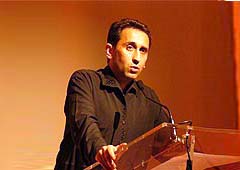French journalist and author Thierry Meyssan said that the country’s government during the presidency of François Mitterrand supplied the anti-Iran terrorist Mojahedin-e Khalq Organization  (MKO also known as the MEK, PMOI and NCR) with HIV-infected blood to be injected to defiant members and defectors.
(MKO also known as the MEK, PMOI and NCR) with HIV-infected blood to be injected to defiant members and defectors.
Meyssan made the remarks in an interview with Seyed Mohammad Javad Hasheminejad, the secretary-general of the Habilian Association, a human rights group formed of the families of 17,000 Iranian terror victims.
Meyssan said that during the Iraqi-imposed war on Iran (1980-1988), while he was doing journalistic works and studying operations at blood transfusion centers, he was taken aback by understanding that the infected bloods in France were being given to the MKO instead of being perished.
The MKO claimed that it needs the blood to be injected to its members in case of being injured or sick while the bloods were HIV-infected and caused aggravatingly painful diseases, he said.
"After that I understood François Mitterrand’s wife had ordered the sale of (infected) bloods to the MKO and helped them in this regard," he added.
Many of the MKO members abandoned the terrorist organization while most of those still remaining in the grouplet are said to be willing to quit but are under pressure and torture not to do so.
A May 2005 Human Rights Watch report accused the MKO of running prison camps in Iraq and committing human rights violations.
According to the Human Rights Watch report, the outlawed group puts defectors under torture and jail terms.
The group, founded in the 1960s, blended elements of Islamism and Stalinism and participated in the overthrow of the US-backed Shah of Iran in 1979. Ahead of the revolution, the MKO conducted attacks and assassinations against both Iranian and Western targets.
The group started assassination of the citizens and officials after the revolution in a bid to take control of the newly-established Islamic Republic. It killed several of Iran’s new leaders in the early years after the revolution, including the then President, Mohammad Ali Rajayee, Prime Minister, Mohammad Javad Bahonar and the Judiciary Chief, Mohammad Hossein Beheshti who were killed in bomb attacks by MKO members in 1981.
The group fled to Iraq in 1986, where it was protected by Saddam Hussein and where it helped the Iraqi dictator suppress Shiite and Kurd uprisings in the country.
The terrorist group joined Saddam’s army during the Iraqi imposed war on Iran (1980-1988) and helped Saddam and killed thousands of Iranian civilians and soldiers during the US-backed Iraqi imposed war on Iran.
Since the 2003 US invasion of Iraq, the group, which now adheres to a pro-free-market philosophy, has been strongly backed by neo-conservatives in the United States, who argued for the MKO to be taken off the US terror list.
The US formally removed the MKO from its list of terror organizations in early September, one week after Secretary of State Hillary Clinton sent the US Congress a classified communication about the move. The decision made by Clinton enabled the group to have its assets under US jurisdiction unfrozen and do business with American entities, the State Department said in a statement at the time.
In September 2012, the last groups of the MKO terrorists left Camp Ashraf, their main training center in Iraq’s Diyala province. They have been transferred to Camp Liberty which lies Northeast of the Baghdad International Airport.
Camp Liberty is a transient settlement facility and a last station for the MKO in Iraq.

